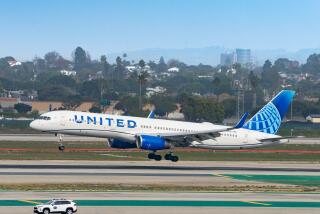United Airlines fined $1.1 million for tarmac delays

United Airlines will pay $1.1 million in fines for stranding passengers on 13 planes for more than three hours last year in Chicago. Separately, the airline is being sued by Sony Music for allegedly infringing its music copyrights.
United Airlines has received the largest fine the federal government has charged an airline for leaving passengers stranded on delayed flights.
The U.S. Department of Transportation issued a $1.1 million fine against the Chicago-based carrier for stranding passengers on 13 flights during thunderstorms in July at Chicago’s O’Hare International Airport.
Under federal rules that took effect in 2010, airplanes carrying more than 30 passengers are prohibited from keeping them stuck on an airport tarmac for more than three hours without offering the option to leave the plane.
During the thunderstorms on July 13, 2012, the Department of Transportation said United kept passengers on the tarmac for up to 4 hours, 17 minutes.
“It is unacceptable for passengers to be stranded in planes on the tarmac for hours on end,” said U.S. Transportation Secretary Anthony Foxx.
The federal agency said United and its regional carrier, United Express, had contingency plans to avoid such delays but did not implement those plans.
The airline issued a statement, saying “We are committed to complying with the tarmac delay regulations and we continue to improve our procedures while maintaining the safety of our customers and co-workers.”
Under a consent order, United has agreed to pay $475,000 of the fine to the federal government, with the rest covering mitigation costs for the passengers and to make corrective measures.
ALSO:
Global Eagle buys UK in-flight entertainment company
Bill would require a second cockpit door on commercial aircraft
Nonstop flights from Dallas’ Love Field sure to spark airfare battle
More to Read
Inside the business of entertainment
The Wide Shot brings you news, analysis and insights on everything from streaming wars to production — and what it all means for the future.
You may occasionally receive promotional content from the Los Angeles Times.











